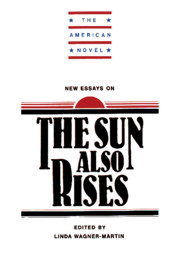Book contents
- Frontmatter
- Contents
- Series Editor's Preface
- 1 Introduction
- 2 Humor in The Sun Also Rises
- 3 The Sun in Its Time: Recovering the Historical Context
- 4 Brett Ashley as New Woman in The Sun Also Rises
- 5 Decoding the Hemingway Hero in The Sun Also Rises
- 6 Afterthoughts on the Twenties and The Sun Also Rises
- Notes on Contributors
- Selected Bibliography
4 - Brett Ashley as New Woman in The Sun Also Rises
Published online by Cambridge University Press: 06 July 2010
- Frontmatter
- Contents
- Series Editor's Preface
- 1 Introduction
- 2 Humor in The Sun Also Rises
- 3 The Sun in Its Time: Recovering the Historical Context
- 4 Brett Ashley as New Woman in The Sun Also Rises
- 5 Decoding the Hemingway Hero in The Sun Also Rises
- 6 Afterthoughts on the Twenties and The Sun Also Rises
- Notes on Contributors
- Selected Bibliography
Summary
TheSun Also Rises, published in autumn of 1926, became along with The Great Gatsby, published the previous year, the novel that captured the excitement of the jazz age and expatriate glamour as well as the cultural dislocation and psychological malaise that were the legacy of World War I. The emotional upheavals of Jake Barnes and Brett Ashley, and their friends Bill Gorton, Mike Campbell, and Robert Cohn, who live episodically, taking risks and contending with the elation or despair that follows in the wake of their adventures, provide a cartography of the experience of the lost generation. In this novel filled with surface excitement – love, sexual rivalry, café hopping in France, the revelry of the festival of San Fermin in Pamplona, fishing excursions in the Spanish countryside – Brett and Jake emerge as the paradigmatic couple who best represent the shift in the perception of gender following World War I. This redefinition of masculinity and femininity was not an abrupt rift in the cultural landscape but rather a gradual shifting of the ground on which the edifice of Victorian sexual identity was built.
The blending of the polarized spheres that traditionally separated the lives of women and men was, in part, the result of the centrifugal swirl of events following World War I. As Paul Fussell has observed in The Great War and Modern Memory, 8 million soldiers died in the trenches of Western Europe in the years 1914–18, and this massive carnage created a generation of men for whom the concepts of glorious battle, honor, and heroism became either suspect or a mockery.
- Type
- Chapter
- Information
- New Essays on The Sun Also Rises , pp. 65 - 82Publisher: Cambridge University PressPrint publication year: 1987
- 16
- Cited by



